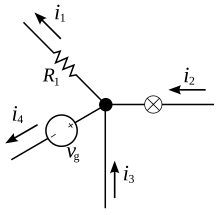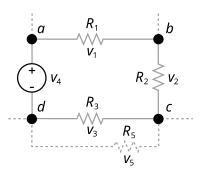Kirchhoff's circuit laws:
This law is also called Kirchhoff's first law, Kirchhoff's point rule, or Kirchhoff's junction rule (or nodal rule).It implies that:
- At any node (junction) in an electrical circuit, the sum of currents flowing into that node is equal to the sum of currents flowing out of that node

current entering any junction is equal to the current leaving that junction. i2 + i3 = i1 + i4
Kirchhoff's voltage laws:
This law is also called Kirchhoff's second law, Kirchhoff's loop (or mesh) rule, and Kirchhoff's second rule. It implies that
The directed sum of the electrical potential differences (voltage) around any closed network is zero, (or) the sum of the emfs in any closed loop is equivalent to the sum of the potential drops in that loop, (or)The algebraic sum of the products of the resistances of the conductors and the currents in them in a closed loop is equal to the total emf available in that loop.

The sum of all the voltages around the loop is equal to zero.v1 + v2 + v3 - v4 = 0
No comments:
Post a Comment